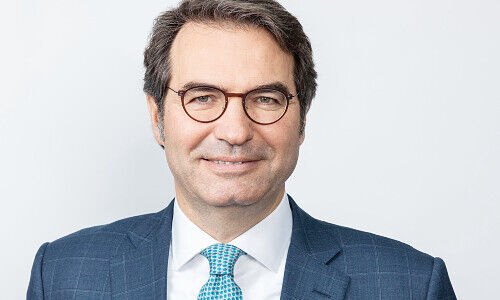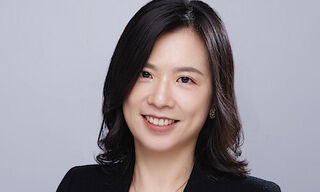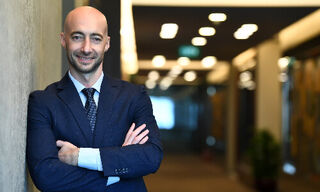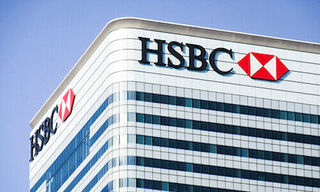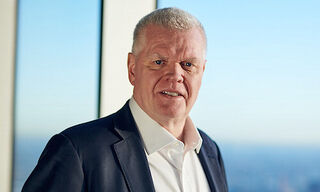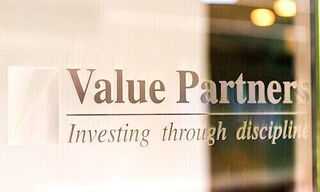With a war chest of several hundred million francs, EFG International is well-placed for acquisitions. But there's a problem, Giorgio Pradelli explains to finews.asia. The CEO of the global private bank spoke about Asia, the need for scale, client advisors, and board member Boris Collardi.
Giorgio Pradelli, speaking of scale, in private banking, UBS is emerging as a $5 trillion giant. Julius Baer aims to manage around one trillion francs ($1.12 trillion) by 2030. Has a new race for size begun in the profession because of the Credit Suisse acquisition?
Scale is indeed important because the costs of running our business are continually rising. This is especially true when a bank operates internationally and is on the ground in different jurisdictions. Talent is getting more expensive, and inflation is also hitting us.
So the bigger the volume measured against these fixed costs, the better?
In the past, EFG weighted the «economy of flexibility» - given by proximity to the client - higher than the economies of scale. Nowadays, good flexibility can be achieved thanks to technology, although the focus is now also on scale.
«Since COVID, there has been a standstill in consolidation»
We acquired BSI based on this consideration. Now we plan to add up to 10 billion francs of new assets organically every year.
But EFG could also acquire another bank, right? You have about 400 million francs at your disposal.
Correct. The management team has shown that it can acquire and integrate. But the problem over the last four years was there were hardly any targets. Additionally, unlike organic growth, acquisitions cannot be planned. That's why we have recently shifted our focus to the latter. But we're still open to acquisitions.
Are there any targets now?
There has been a phase of consolidation. But since COVID, there's been a standstill.
Where would EFG want to make acquisitions?
Switzerland is very important to us. We want to make acquisitions where we already are - including the UK, Luxembourg, or Asia. But it has to be culturally appropriate and bring in an investment return of 10 percent over three years.
You could also be taken over. There's a rumor is Julius Baer is looking at buying EFG.
I've been at EFG International for eleven years now, and almost every year such a rumor circulated.
«Boris Collardi helps us with all strategic issues in the region»
Since then, I have only ever done acquisitions. Our owners have also backed our growth strategy. To be honest, such reports are just noise for us.
With Boris Collardi, the bank has an ex-Baer boss on its board of directors. So such rumors are only natural...
I've known Boris for many years. He's someone who knows the business inside out and has the search for growth opportunities in his genes. He also has a huge network. He supports us a lot as a sparring partner, especially in Asia. He is also chairman of the Asia-Pacific Advisory Board there.
Does he help you find acquisition targets in Asia?
We're very interested in an acquisition in Asia Pacific, having already made an acquisition in Australia in 2019 with Shaw & Partners. Boris helps us with all the strategic issues in the region.
Boris Collardi as well as chairman Alexander Classen are both former bank CEOs. Isn't there a danger that, as CEO, they will constantly interfere with your operational business?
In Switzerland, the division of roles between management and the board of directors is clearly defined. That works very well for me. The management can benefit a lot from the long experience of both of them. We work together excellently as a team.
If you look at the profits of Swiss banks, you get the feeling there's a bonanza going on right now. As a veteran in the business, are we experiencing a period like never before?
I've been in banking for 32 years, but I feel like I'm starting all over again!
What do you mean?
There's always something new for me to learn. I observe that not all banks are doing equally well, as we have seen recently in the US and Switzerland. Strategic missteps continue to take their revenge.
«If the business is doing well, you accept heightened adrenaline»
But what I have never seen before was an interest rate turnaround in this form. We saw the fastest rise in interest rates since World War II. And rising interest rates are certainly better than negative interest rates for the banks.
So a bonanza after all?
Not for all market participants. The markets remain fragile, and the geopolitical situation is, in my view, as complex as it's rarely been in the past 30 years. This makes the feeling of security all the more important.
It's paid off for us and our customers that we see our balance sheet as a fortress and always keep plenty of liquidity on hand. I remain concerned the turnaround in interest rates could still cause problems in the real economy. We remain very vigilant.
So press on the gas and the brake at the same time. Are you experiencing more stress than ever as a CEO in such an environment?
What I've been able to observe over and over again: There is a correlation between the performance of the team and their motivation. If business is going well, you accept an increase in adrenaline.
But if the performance is poor, this demotivates and stresses the employees and also oneself more than anything else. At the moment (knocks on the table) we're experiencing positive stress. That's why I don't want to hear that we've already reached the summit.
Why?
Because then it only goes down! That is bad for motivation. I prefer to say there are still numerous peaks ahead of us. I also put the question about stress to Boris Herrmann, the skipper of the Malizia sailing racing team, where EFG is one of the main sponsors.
What did the skipper say?
He has to weigh risk and performance very carefully. Because if he takes too risky a course and suffers an accident, the race is over for his crew. Boris explains that he always has two hearts in his chest.
One beats for winning, and the other weighs up the risks. Together, he said, the two hearts drive him forward. We are now using this image at EFG.
You are a sailing fan yourself. Have you never wanted to take time off to accompany Boris Herrmann?
For heaven's sake, they're professionals. As a sailor, I'm just an amateur. I prefer to limit myself to managing EFG professionally.
If EFG International were a car: What kind of car would the private bank be?
(Laughs) A Tesla, perhaps? The fact is that there aren't many new car brands, and in just under 30 years since our founding, we have become one of the big five private banks in the financial center. Innovation and digitalization are priorities for us. Above all, our customer service is top-notch.
The question stems from the fact that EFG is currently firing on all cylinders. Chairman Alexander Classen recently said publicly there's little time left to poach client advisors from Credit Suisse. That's caused quite a stir.
Our strategy of profitable growth has been in place since 2019, and in that respect, the engagement of new client relationship officers, or CROs for short, as client advisors are known at our bank, is nothing new.
Growth is in our DNA, and it's primarily organic. What happened in March - not only with Credit Suisse but also because of the banking crisis in the US - was like a jump-start in the market for talent.
In the first half of the year, EFG hired 75 CROs, a third of whom have come from Credit Suisse. Are more people joining you from the bank?
We continue to recruit, but don't put ourselves under pressure to do so - nor do we focus on individual competitors.
«It is likely that we will be at over 100 new hires by the end of the year»
We're targeting 50 to 70 new hires a year into 2025 as part of the strategy. In that sense, we have already exceeded our target this year.
So you're sitting back now?
Of course not. We'll likely be over 100 new hires by the end of the year. The important thing for us is that quality matters more than quantity.
Staying with Credit Suisse employees; they bring the culture of a large corporation, while EFG's client advisors have to be very entrepreneurial. How does that fit together?
Our CROs indeed enjoy a high degree of autonomy in certain matters - there's no segmentation of clients in the bank, for example - and they share in the success according to a transparent metric. But they're firmly integrated into the compliance and objectives of the company.
But what does that mean in terms of the suitability of those coming from large banks?
If you're prepared to dig in and build up a long-term relationship with your customers, then you've come to the right place. It doesn't matter where he or she last worked.
«Our golden rule is that our earnings grow twice as fast as our costs»
I once worked for Deutsche Bank, and many CROs were also previously at a major bank. They now appreciate working for a company that focuses exclusively on private banking.
Your CROs can look forward to more pay, as EFG has had an extremely successful first half of the year, with a 47 percent increase in profits. Is the second half also record-breaking?
We're very pleased with our first-half performance. However, this was also due to rising interest rates. At 100 basis points, our margin is well above the target of 85, and the drivers of the first half remain intact for us. Therefore, we're confident that we'll perform well in terms of growth and profitability by the end of the year.
You were previously EFG's Chief Financial Officer, and efficiency has remained a key concern for you as CEO. In the past six months, costs have also climbed by double digits. Is that sustainable?
That's a good question. We already booked a large part of the investments for 2023 in the first half of the year. In the second half of the year, we'll invest less, which will also impact costs. Our golden rule is that our revenues grow twice as fast as our costs.
We've managed to do pretty much exactly that, with a 20 percent increase in earnings and an 11 percent increase in expenses. On average, revenue growth in the financial industry is more like 6 or 7 percent. In this respect, we have to ensure that the operational side remains very efficient.
How?
We've announced we'll increase the savings target by another 50 percent to 60 million Swiss francs per year from 2025. Our platform must become more efficient every year so that we can invest in staff, infrastructure, and ultimately scale.
Piergiorgio Pradelli has been CEO of EFG International as well as EFG Bank since the beginning of 2018 and holds other important positions within the banking group. Before he was appointed bank chief, he was EFG's deputy CEO from 2014 and chief financial officer from June 2012. He joined the company in 2003 and subsequently held various roles, including playing a key role in the bank's IPO in 2005. The 56-year-old Turin native began his career at Deutsche Bank, where he held various senior positions in Frankfurt and London from 1991 to 2003.

